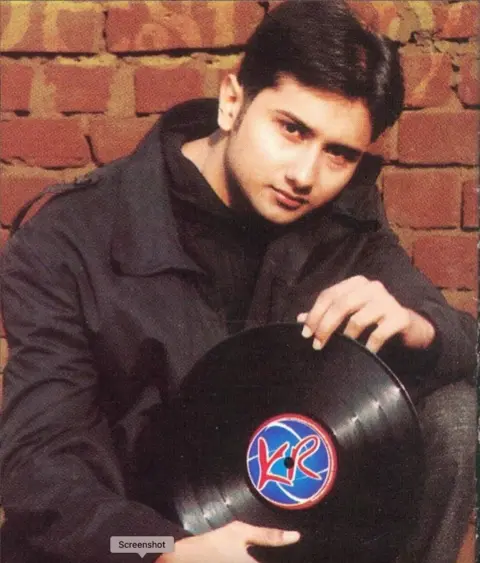Physical Address
304 North Cardinal St.
Dorchester Center, MA 02124
Physical Address
304 North Cardinal St.
Dorchester Center, MA 02124

BBC News, Delhi
 Instagram/Yo Yo Honey Singh
Instagram/Yo Yo Honey SinghAbout 15 years ago, an Indian rapper of modest origin came across the then hip-hop music scene in the country and transformed it forever.
He annoyed, laughing and worried his listeners, daring them to explore the “devilish” contours of their minds as he sang rhymes for parties, drugs and “seductive” women. His songs played in clubs and weddings that erupted from stereos at big parties and roadside tea stalls.
Then, at the peak of his career, he disappeared. Seven years later, Yo Yo Haden Singh returns – with a new album and a continuing music tour, claiming that he has changed a person after a prolonged battle with drug abuse and struggles for mental health.
The 41-year-old singer and producer was once one of the biggest music stars in India, a figure who “moved the cultural weight of hip-hop music,” says music journalist Bhani Kapal in a famous, recent Netflix documentary in Singh.
But he was also deeply contradictory – and by his own recognition, “aggressive and reckless man”, routine accused of promoting vulgarityDebaurate and violence through his music.
Many have criticized the Singh’s texts for depicting violence against women and rape, an image that has gained more traction in the press after his ex -wife and childhood beloved accused him of domestic violence in divorce. Singh denied the charge.
Seven years later, the singer is no longer the challenging hitmaker who once managed the charts with his provocative hymns, protruding leg.
Many have changed during the intervention years, including the Indian hip-hop, which has become a thriving, dynamic space. The performers, inspired by his sound, have now surpassed him as leading voices of the genre.
Singh also looks different. From someone who has identified himself as the “omniscient master of the universe”, he is now defined as a God -fearing man who believes in good energies, the cyclical nature of life and “scientific astrologers”.
 Ghetto images
Ghetto imagesHe claims that his music is already more conscious, moving beyond drugs to something deeper. But loyal fans say he has lost his advantage and his latest songs have not left a mark.
“He has a basic audience that will stick to him forever … But his vision is already old. He is outdated,” Kapal says.
But Singh is not yet ready to be written off.
Instead of trying to conceal or defend his personal struggles with glory and drugs, he made it at the center of his return.
After his return, Singh openly acknowledged his fights with addiction and mental health. “The drugs have completely destroyed me,” he told Lallantop, a digital news platform. “I was lost by glory, money and women. I was like a devil, completely satanic.”
In interviews, he is witty and calm, speaking with the clarity of a tormented artist who, after fighting his inner demons, seems to have unlocked the spiritual truth
“What is happening is coming around, I really believe it,” he said recently. “It took me a long time to get out of where I was stuck. But now I’m back.”
Born Hydesh Singh in Punjab, he grew up in a narrow Delhi neighborhood. These difficult early years shaped his music and still echoed his work today.
“This ghetto was my home, my hood, it will always be,” he is often heard to say.
 Instagram/Yo Yo Honey Singh
Instagram/Yo Yo Honey SinghSingh always knew he wanted a career in music. He started as the DJ College, later went into full-time production. “I wanted to strike and produce music, not sing or write,” he says.
But after years as a small producer in Punjab, he realized that this would not be enough. “My sounds were too urban for the place. People did not understand it. That’s why I had to go beyond the state.”
So he went solo. In 2011, the Singh released the international peasant, his breakthrough album. Mixing Punjabi Folk – Its Dhol Beats and String tunes – with Global Hip -hop, he created something completely new.
For three months it seemed that the formula had failed. Then everything changed. At night, the songs passed viral, topped the charts, won awards – and catapulted Singh in Bollywood.
Brown rangA song about the global ambition of a brown man, became the most watched YouTube video in 2012. Filmed in Dubai with a $ million budget, she introduced many Indians in hitting hip-hop-faster cars, bags of clothes, gem and gold-plated gold chains.
Despite criticism of his misogynistic lyrics, Singh packed stadiums and hits erupted, piercing Bollywood with songs for stars like Shah Ruh Khan and Akshai Kumar.
“Many times, my texts were garbage, even I knew it. But people still listened to it because the sound was so good and fresh,” he told Lallantop.
 Ghetto images
Ghetto imagesBut climbing Singh for glory coincided with his personal fall.
“I hit drugs and alcohol, smoked 12-15 joints and descending bottles. I abandoned my family, lost control. This time, I got so high that I bit a friend on his stomach eight times,” he told Lallantop.
In 2017, Singh fell into the middle of the tour – a moment that shook him. He left music and substances, returned to Delhi and began recovering with a global team of doctors and therapists. “I told my family that I was mentally unwell. I can’t do anything until I got better.”
Singh says he has been sober for seven years, except for casual beer.
“I was in hell and back,” he says in a famous one. “Even now I wake up vague because of the medication.”
Fans, however, appreciate the harsh honesty of the SINGX about his self -destructive tendencies – and his efforts to overcome them.
“No one is perfect. But at least Sing is trying to be better. He may have left the scene for a short while, but his music has never stopped playing,” says Nandini Gupta, a Delhi-based student.
Others see his transformation as performative, noting that his new music remains problematic. “Although he is toned, he still has women and talks about money and glory only,” says listener Bushra Nazi.
As much as you see him, Singh’s redemption feels like another challenge for his audience – pushing them to accept his complex past and give another chance to their music.
“I have been far away for seven years, but it will sneak all the crazy ones in the next seven,” he said recently.
“I came back and I want the same love I received seven years ago.”